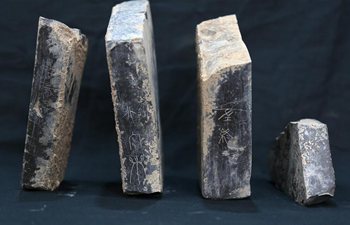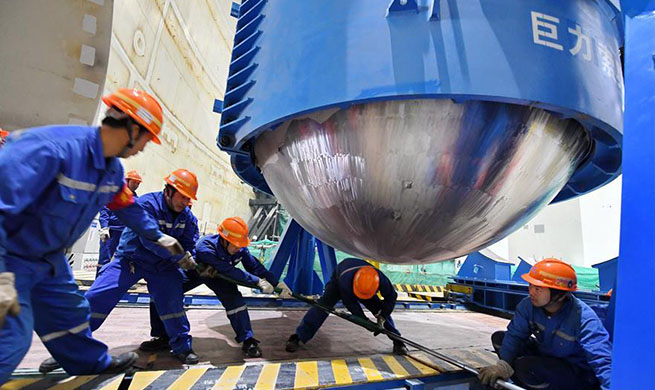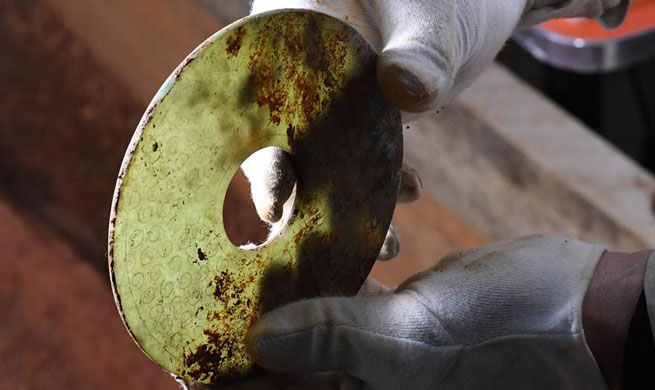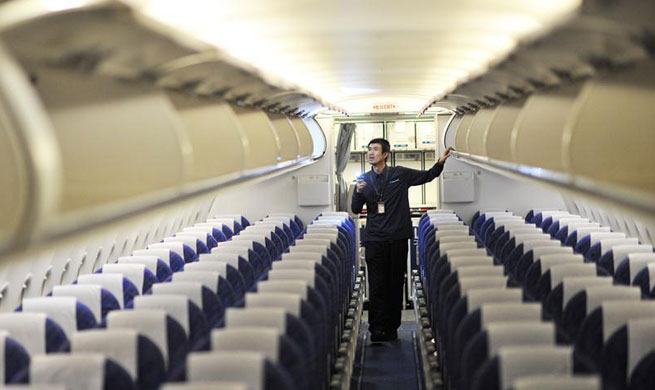BERLIN, Jan. 29 (Xinhua) -- Alleged fresh evidence that leading German car makers commissioned unethical experiments to demonstrate the limited health risk posed by modern diesel engines prompted angry responses from politicians and animal rights activists on Monday.
Following media revelations that monkeys were forced to inhale fumes from a Volkswagen diesel engine with manipulated emissions software, the newspaper Stuttgarter Zeitung reported that humans were also exposed to nitrogen oxide in experiments conducted by the lobby institute European Research Group on Environment and Health in the Transport Sector (EUGT). EUGT was established by the German automotive firms Volkswagen, BMW, Daimler and Bosch in 2007 before being dissolved in June 2017.
Reacting to the news, German Chancellor Angela Merkel harshly criticized the EUGT's experimental practices and demanded a full investigation into the scandal.
"These experiments with monkeys, and even humans, are ethically unjustifiable," a statement by Merkel's official spokesperson Steffen Seibert read. Seibert added that it was the job of car makers to reduce emissions produced by their vehicles, rather than attempting to prove that nitrogen oxide was not harmful.
Similarly, economics minister Brigitte Zypries and environment minister Barbara Hendricks expressed their shared anger and disbelief at the revelations on Monday.
"There are clear ethical boundaries which cannot be breached," Zypries told the press.
Hendricks described the publicized information about the trials as "disgusting", arguing that it was beyond doubt in the scientific community that inhaling nitrogen oxides posed a health risk to humans.
"That a whole industry has apparently attempted to dispense with scientific facts through brazen and dubious methods only makes the whole thing even more outrageous," Hendricks said.
The growing scandal raises particularly awkward questions for Stephan Weil, the governor of Lower Saxony. Due to the significant proportion of Volkswagen shares controlled by Weil's state, the governor occupies a seat on the automotive giant's powerful supervisory board. The SPD politician referred to "alarming reports" on Monday and called for a "swift and thorough" investigation into the accusations.
Weil said he could not imagine that other board members were aware of the practices and announced that the state of Lower Saxony would lodge a "corresponding urgent request" with Volkswagen's management in the course of the day.
In the meantime, several non-governmental organizations (NGO) including the German Animal Protection League and German Environmental Aid decried the "pointless experiments" and "fake research" of the EUGT.
Christina Deckwirth of the organization LobbyControl noted that the scandal was eerily reminiscent of the "fake science" methods employed in the past by the tobacco industry. Tobacco industry firms had funded scientists to understate the detrimental health effects associated with their products in order to prevent stricter legislation. Deckwirth urged the German government to end its "cosy relations" with the automotive industry and adopt a less accommodating stance.
Responding to widespread reports that humans were harmed in automotive industry experiments, however, Professor Thomas Kraus, who led the controversial 2013 study at the University of Aachen, emphasized that it was not related to diesel engines.
"There is no connection to the diesel scandal," the academic insisted, but acknowledged the receipt of a partial grant from the EUGT. Scientists had in no way been influenced in their work by the likes of Volkswagen, BMW and Daimler, he said.
Kraus told the press that the experiment in question was instead actually aimed at examining the effects of emissions levels at workplaces. A total of 25 healthy human participants were exposed to low levels of nitrogen oxide pollution comparable to those encountered naturally in cities for short periods of time. The ethical commission of the University of Aachen reviewed and approved the study which was subsequently published in 2016.
Whether or not humans or monkeys were involved in controversial EUGT studies, all of the involved car makers have already sought to publicly distance themselves from the research. The revelations coincide with the German automotive industry beginning to recover from long-standing "dieselgate" and "cartel" scandals, posting several record annual earnings figures in 2017.
Volkswagen quickly issued an apology for the study involving monkeys, while leading corporate figures personally condemned the animal experiment. The Wolfsburg-based firm admitted that individual employees had been aware of the U.S.-based trial in question.
"In the name of the entire supervisory board, I expressly distance myself from these kinds of practices," said Volkswagen chairman Hans Dieter Poetsch. Bernd Osterloh, head of the Volkswagen Workers Council, demanded personnel changes as a consequence.
BMW told the press that it had not participated in the studies cited in media and had launched an "immediate internal investigation" into the work of EUGT.
Speaking to Xinhua on Monday, a spokesperson for Daimler affirmed the company's statement, stressing that neither the Stuttgart-based company nor the general public had "any information about the VW defeat devices" at the time of the animal study.
















